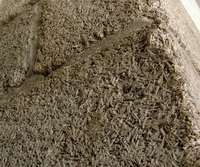Remember hemp? Dagga's non-narcotic cousin, the wonder plant that was going to alleviate rural poverty, stimulate small enterprises, provide jobs, houses, textiles, paper, food and possibly even save us from global warming and the oil crisis?
Well, that’s what we were told when the government launched the National Hemp Initiative back in 1998.
So where are all the fields of waving weed?

You’d have to go to the Eastern Cape to find them, and then you’d find only five little plots, adding up to about a hectare in total, each surrounded by a two-metre-high fence in case anyone is stupid enough to try and smoke the stuff.

After almost 10 years and the investment of tens of millions of rands, the government’s hemp-growing project has done little but prove that hemp grows very well in South Africa.

There is a small and flourishing local hemp industry, producing everything from clothing, cosmetics and bio-friendly nappies to food products and building materials, but the hemp they use comes from elsewhere, mostly China.

Why aren’t we growing our own? The short answer is that the law still doesn’t differentiate between dagga and industrial hemp.
The law, in this case certainly, is an ass. The hemp strains authorised for research in South Africa contain less than 1% of the psychoactive agent tetrahydrocannabinol (THC). To be of the slightest interest to a recreational user, the plant would have to contain at least 3% THC, and no drug dealer of any disrepute would touch anything under 7%.

More than 40 other countries have managed to make the distinction, including most of Europe, Canada, Russia, India, Thailand, South Korea and, of course, China, which produces most of the world’s crop. Global hemp sales have rocketed from just $10 million in 1996 to $250 million in 2002, the last year for which we could find statistics. But the market is continuing to boom as the search for greener alternatives to everything becomes more urgent.

A noted absentee from the list of growers is the US, which, like South Africa, uses the spectre of mass drug addiction to justify its indiscriminate suppression of this incredibly useful and versatile plant (although this hasn't prevented six US states from issuing growing permits in defiance of federal law).
Where there is no reasonable explanation for government policy, it is not unreasonable to follow the money.
American corporate interests are widely blamed for the ruinous 1937 “marijuana” tax which destroyed the US hemp industry overnight. For hundreds of years before that, hemp had been an important fibre crop, used for sails, rope, clothing, paper, building materials, fuel, food and medicine. It was so important that you could be jailed for refusing to grow it.

But the well-connected timber and cotton barons, along with the increasingly muscular petrochemicals industry, weren’t willing to compete with a material that had so many uses, and which anyone could grow in their own back yard.
Could a similar conspiracy be behind South Africa’s reluctance to allow even the most tightly-regulated cultivation of a commercial hemp crop?

One man who has no doubts is former advisor to the Department of Agriculture Thierry-Alban Revert.
Revert, a food technology engineer, scientist, entrepreneur and sustainable development consultant, was a key member of the governmental task team charged with redesigning South Africa’s agricultural policy after 1994.

The team produced a series of policy framework documents aimed at transforming the agricultural sector by creating commercial opportunities for small farmers.
As both Revert (and any small farmer) can tell you, few of their recommendations have made it off the page. [Small farmers mean small money for politicians. Agribiz, however ... – Ed.]
But one proposal, the National Hemp Initiative, was enthusiastically adopted by government at the time.
Even the cannabis-shy Department of Health was persuaded to grant special permission for a pilot growing project, and the first seeds were planted in 1996 at the Agricultural Research Council's testing centre in Rustenberg.
Revert, who says he knew nothing about hemp before he began his research, was so excited about the plant’s potential that he joined the hemp revolution.
As a member of the officially sanctioned National Organic Produce Initiative, he joined forces with a number of other NGOs to form the Western Cape Hemp Initiative. In 2004, they partnered the provincial Agriculture Research Council in growing trials in Riversdale and Elsenberg, Stellenbosch.
The trials continued for four seasons with great success, so everyone involved was keen to move on to the next step – actually making use of the crop...
They devised a project called Grow your House which would encourage rural communities to farm their own hemp and use it as building material. One hectare of hemp can produce enough material in four months for an RDP-sized house – a much stronger and more comfortable one too. The company hoped to build between 10 000 and 20 000 such houses over the next 10 years.
But this time, they were refused permission even to import the seeds.
Revert says they were told that the three hemp cultivars registered as industrial crops by the Department of Agriculture had “disappeared” from the register.

“It’s unbelievable. After all these years ... they’ve spent R65 million, and we’re back at the beginning.”
Revert blames greed, both of the national research councils which are getting all that tax-payers’ money to investigate what everyone already knows, and of hemp’s competitors in the commercial world.
“And of course the research councils have long-standing relationships with these industries, so their interests are often the same.”
Revert says he has spent enough time in the boardrooms of big corporations to know how they operate, and that he has no doubt that rival industries will do anything to stop hemp in its tracks.
“This is the worst form of insidious colonisation of our resources and people. The country has moved but the basic players in the first economy are the same. These guys have not transformed or changed their economic agenda.”
Hemp advocates like Revert can recite the plant’s competitive advantages like litany.
“It produces four times as much cellulose per hectare as a tree plantation, and it produces it in four months, while timber takes seven years.
“The pulp is almost white so you don’t need to use chloride bleach like you do with wood pulp.
“It is a more versatile fibre than cotton and more sustainable: it contains a natural pest repellent, it uses much less water and fertiliser and if you plant it properly, you don’t get weeds, so you don’t need herbicides. (So there is no profit in it for the agro chemicals industry? Bad idea!)
“It is also a very effective rotational crop – far better for enriching the soil than a legume.
“Bricks made from hemp and lime are seven times lighter than those made from clay or cement, provide excellent insulation and are much stronger.
“Cement uses huge amounts of fossil fuels so it is a carbon taxing industry, while hemp is a natural carbon sink (absorbs and holds carbon).
“Hemp seeds are a wonderful food. They contain more essential fatty acids than any other vegetable source and they are high in protein, B-vitamins and fibre.
“The plant has a very complex DNA so it is almost impossible to create a genetically engineered variety.”
And much, much more.
“So you can see,” Revert concludes, “why all these industries would be against hemp. Especially since it is so easy to grow. You don’t need to be a big corporation with big plantations and machinery.”
As far as he is concerned, if the government is serious about its developmental agenda, it “has a duty to promote this technology immediately”.
“In almost 14 years of democracy nothing has changed. The more we delay stuff, the more people get poor ... and poorer and poorer. This is very painful for all of us.
“Climate change is another reason this is so urgent. Hemp is not only relevant as a crop, but for the health of the planet.”
He says that in the coming weeks he intends “engaging” more strenuously with the Department of Agriculture in a last ditch attempt to make them see sense.
“I will try to explain why this is so urgent. If the explanation route doesn’t work, we will have to consider other options. Like a public awareness campaign. Perhaps even the legal route.”
In the meantime, the NGO will press on with its housing project, but it will be on a far smaller scale and will have to depend on hemp imported from more enlightened, more farsighted nations.
www.InternAfrica.org Continues to focus on delivering sustainable appropriate affordable carbon efficient cannabrick building options to the Western Cape Habitat Crisis.

(Next month noseweek takes a closer, critical look at the reasons and explanations offered by those hampering hemp's progress.)
Noseweek A prototype three-bedroom house, funded by the taxpayer, will go on show today. The home is part of a government drive to build more housing with a smaller carbon footprint.
A prototype three-bedroom house, funded by the taxpayer, will go on show today. The home is part of a government drive to build more housing with a smaller carbon footprint.




















